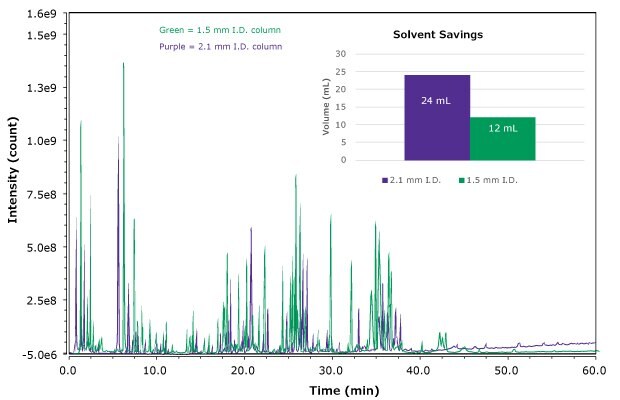UHPLC-MS Bottom-Up Analysis of Trastuzumab - Saving Solvent by using a smaller I.D BIOshell™ Peptide C18 Column
Introduction
Bottom-up analysis (also called peptide mapping) is a routine assay performed by analysts in the biopharmaceutical industry as determining the primary structure of a biotherapeutic is a critical quality attribute (CQA). Narrow inner diameter (I.D.) columns with 15 cm lengths are typically employed for this analysis in order to achieve high resolution and sensitivity. However, the peptide mapping method requires a long run time and, therefore, utilizes larger volumes of solvent than shorter methods. This requirement leads to higher costs of the method in terms of higher volumes of solvent used as well as an additional expense in disposing of the used solvent. This article demonstrates the use of a new, 1.5 mm I.D. column in reducing solvent consumption for peptide mapping techniques without compromise in method performance (Figure 1) as can be derived from 98% sequence coverage on both columns.

Figure 1.Bottom-up analysis of trastuzumab on BIOshell™ A160 Peptide C18 columns with 2.1 (purple) and 1.5 mm (green) inner diameter (conditions see Table 1).
Conclusion
This application note described the use of a new 1.5 mm I.D. column to reduce solvent consumption in peptide mapping workflows without compromising efficiency. As noted, 50% less solvent was consumed, as compared to a 2.1 mm I.D. column, using the 1.5 mm I.D. column as the optimum flow rate for this column is 0.2 mL/min. This observation translates to only 12 mL of solvent being used in this assay versus 24 mL using a 2.1 mm I.D. column. By using less solvent, the cost per sample is reduced as well as the cost of waste disposal, making this a greener method. Finally, sensitivity, in general, was improved using the 1.5 mm I.D. column vs. the 2.1 mm I.D. column, enabling more accurate quantitation of signature peptides as well as the detection of post-translational modifications.
For the complete offer and to download the brochure on BIOshell™ columns visit SigmaAldrich.com/HPLC
Para seguir leyendo, inicie sesión o cree una cuenta.
¿No tiene una cuenta?